Necessity often drives gardeners to design their outdoor spaces with low or easy maintenance requirements. Is there enough time to look after the garden, and do they have the ability to care for it? There is no such thing as a zero-maintenance garden, but there are ways to create a stylish landscape that’s also low maintenance.
With another gardening season ahead, now is a good time to decide if your yard’s current design suits your taste and lifestyle, as well as the time and enthusiasm you have to maintain it.
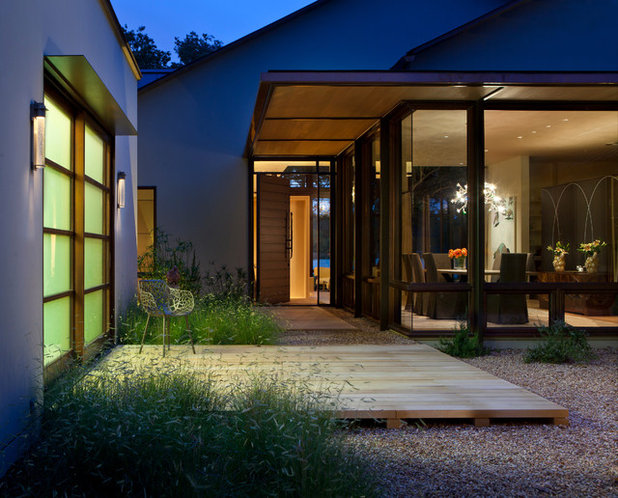
Furman + Keil Architects
Before changing your existing garden or planning a new one, think about the function(s) that are important to you and how much time you can put into upkeep, then balance the two. There are three main areas to consider in your design, and decisions regarding these areas will affect how much time will go into maintaining your yard.
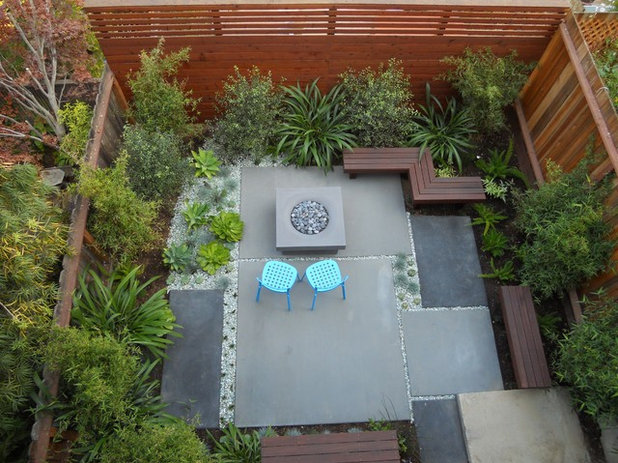 Hardscape
HardscapeMore hardscape in a garden generally means easier upkeep. We are talking about things like paths, walls, steps and decks. The initial cost can be a deterrent when deciding to include large areas of hardscape, but the long-term maintenance benefits and replacement costs balance this expense.
In a nearly maintenance-free approach to gardening, it would be possible to convert a whole area to some sort of hard surface, especially in smaller gardens. Though this space would require minimal maintenance — sweeping and an annual stain or power wash — it would be expensive to install, and you could end up with a concrete jungle for a garden.
The answer is to mix materials with carefully selected plantings, as shown here. Expanses of pavers or concrete can be enlivened by mixing different materials, tones or textures. Most gardens require some easily maintained hard surface to relax and entertain on, but the size of this area should relate to its function for your lifestyle.
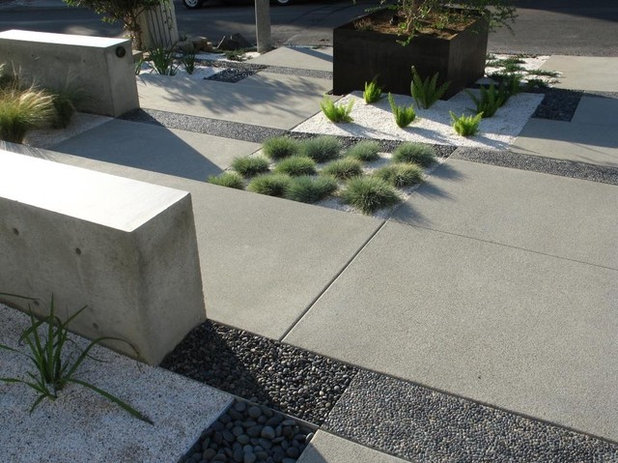
Grounded - Richard Risner RLA, ASLA
If you’re worried about weeds growing through wide sweeps of gravel — even if you’ve used a weed barrier — divide larger areas of paving with smaller, more controllable, strips of gravel or stones and blocks of ground cover plants.
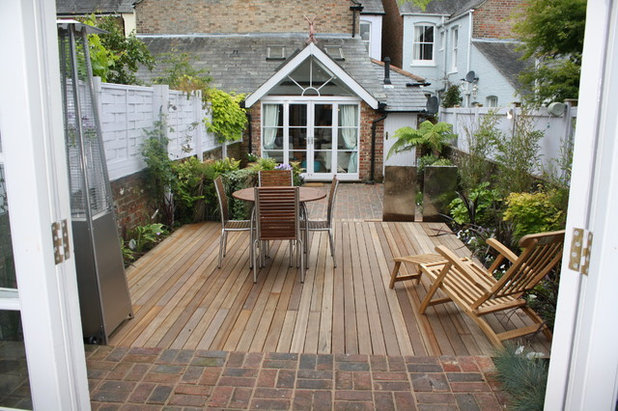
Andy Stedman Landscape & Garden design
Mixing brick paving and wood decking, as shown here, is a great way to add interest while keeping maintenance to a minimum.
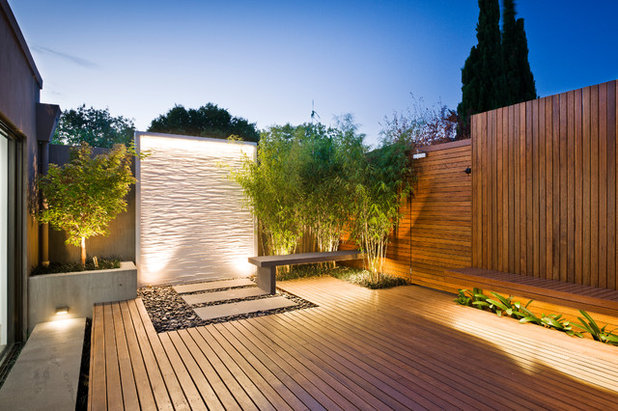
Decking can be a cost-effective way to cover large areas with hardscape in a small garden. It does have certain maintenance requirements to keep it looking good and safe to use. Natural wood can become green, grimy, slippery and plain dirty after the winter, with the surface exposed to elements like sunlight, rain, snow and frost. Luckily for the time-shy, decking maintenance is typically only an annual event that has just three simple steps: cleaning, restoring and protecting.
Learn more about what to know when adding a deck
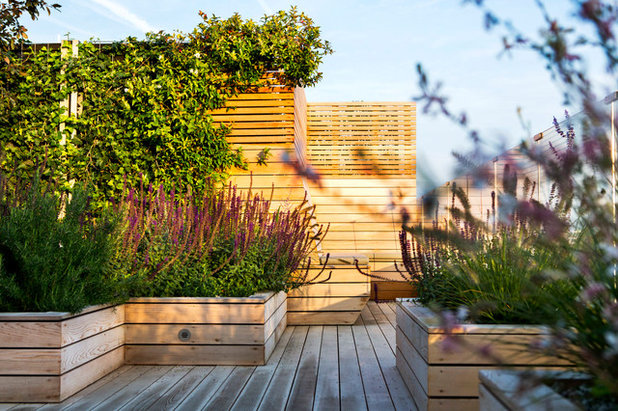
Town and Country Gardens
PlantingsNo plants are completely maintenance free, but it is possible, with careful selection, to have options that are both attractive and easy to care for. And where you put them can help lower maintenance requirements.
For most time-strapped gardeners, tending to plants is the main concern, but this is easier if you plan carefully. Before choosing any plant, check the expected mature height and spread — you don’t want to be spending time pruning because the space you chose is too small for the plant. And make sure the plant is native to your region or appropriate for your climate and soil conditions. If the plant thrives, it will require less attention.
Browse native plants on Houzz by U.S. region
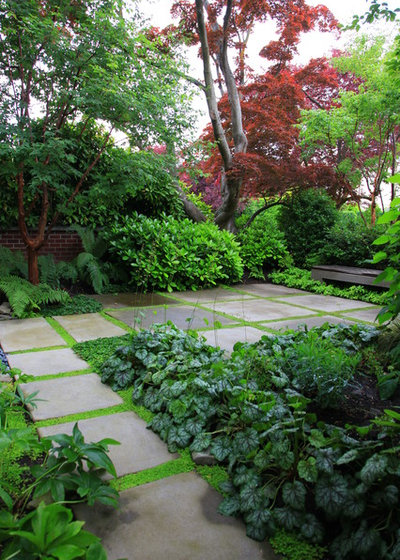
Paul Sangha Landscape Architecture
Most routine garden work involves plant maintenance — pruning, staking and, in the case of herbaceous perennials, lifting and dividing, as well as cutting back dead foliage at the end of the season. To avoid an annual maintenance blitz, you may want to reduce the amount of herbaceous perennials in your garden and replace them with shrubs and ground cover.
Shrubs can deliver interest year-round with flowers, leaves, colorful bark and berries lighting up the garden through the seasons, while also adding structure to the overall garden design. It is helpful to choose shrubs with staggered flowering periods and pruning requirements, so that the maintenance will be spread out over more than one season.
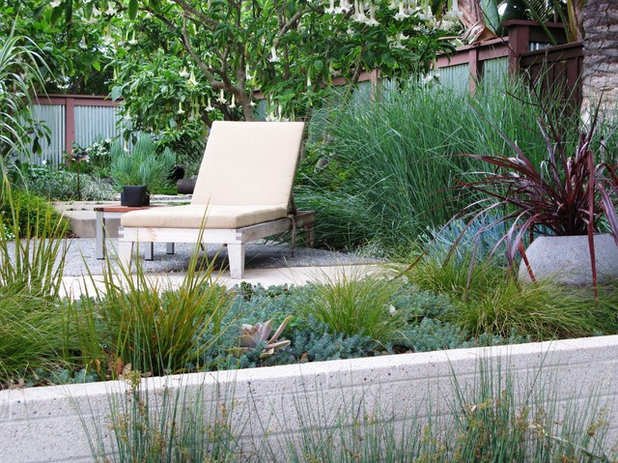
debora carl landscape design
Plant shrubs and ground covers using a weed-suppressing membrane that can be covered with mulch. This will reduce the labor requirement of weeding, as any weed seedlings that do sprout from the mulch will be easily removed.
Combining a ground cover with mulch is an ecologically sound way of planting a lower-maintenance garden. In addition to minimizing weeding, this mix will also require less watering, another time-consuming element in any garden.
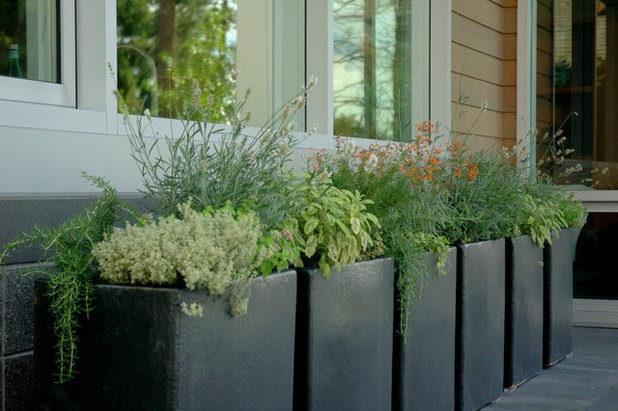
ModernBackyard
Containers traditionally require a lot of work, including planting, repotting, feeding and watering. If planted containers are part of your design, try to use the largest you can, as a greater soil volume will reduce the frequency of watering needed.
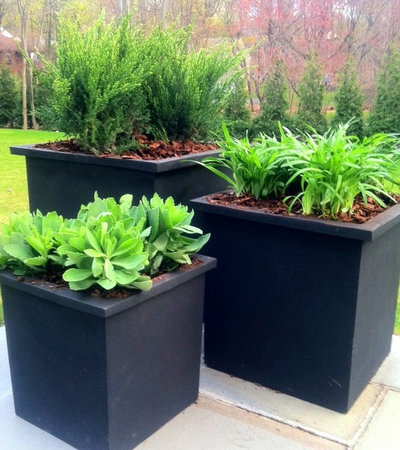
Samarotto Design Group
Forget seasonal bedding plants. Though they provide great color, they need to be replaced every season. Think long-term and use evergreen shrubs, perennials or herbs, such as rosemary or sage, that are hardy and will look after themselves with little attention.
Perennials shown here include
Liriope muscari ‘Big Blue’ and Autumn Joy sedum. All they need is an annual trimming in the spring to rejuvenate their growth, and with feeding and top-dressing they will last for years.
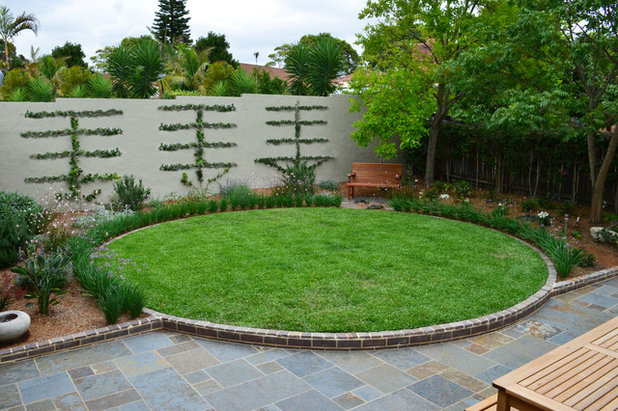
Outhouse Design
LawnsThis may seem like an odd choice if you are trying to create a less labor-intensive garden, but careful designing, planning and considering of maintenance can make a lawn a suitable choice for the time-strapped gardener.
Lawns can be the most time-consuming feature in gardens, but your lawn doesn’t have to look like an English bowling green, manicured to the nth degree. And while some homeowners are replacing their lawns with hardscape or other plant materials, lawns are still treasured in gardens with children and, depending on your climate, can be a relatively inexpensive landscape feature.
If you do choose to keep turf in some portion of your garden, there are many ways to cut down on the upkeep. Allow your lawn to grow a little longer and don’t cut too much off the top, to promote a stronger root system. Invest in a mulching mower that chops the clippings before returning them to the lawn. By allowing these clippings to return to the lawn, you will reduce the amount of feeding, as these clippings will replace some nutrients. Save time on hand edging by installing permanent edges formed from one of the many metal systems available, or brick, as shown here.
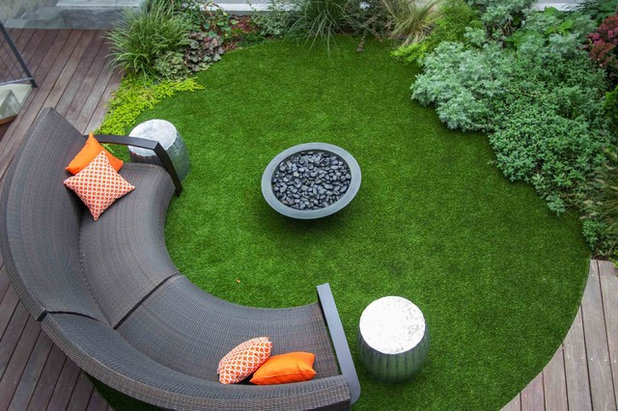
Outside Space NYC Landscape Design
No time for mowing yet still want a lawn? Some homeowners and designers incorporate artificial turf into their gardens; there are varieties now that more closely resemble real grass, and there are many styles available. Like hardscape, artificial turf is a big investment upfront, but it will save you time mowing, and you’ll save on the cost of fertilizers, weed killers and irrigation.
Read more about synthetic turf to see if it’s right for you
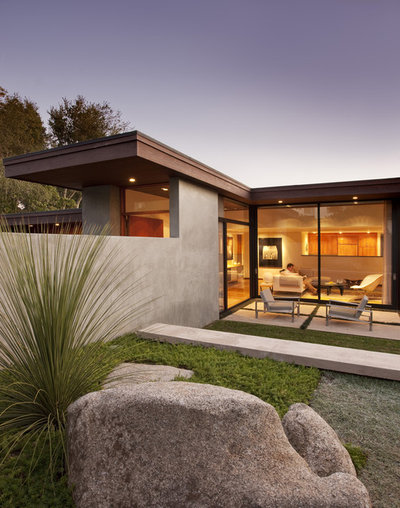
Allen Construction
The other solution is to ditch traditional grass for your lawn in favor of a low-growing plant or lawn alternative that requires a lot less maintenance. Sedums are favorite ground covers for this purpose. There are many varieties, so check which are suitable for your zone. No mowing or watering is required, but you’ll have to do a certain amount of weeding until the ground cover becomes established. Sedges are also great lawn alternatives and are native all over the U.S.
7 Low-Maintenance Lawn Alternatives
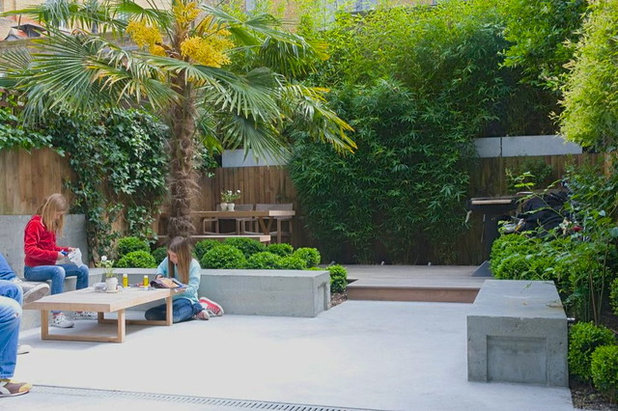
Claire Garden Design
With just a little thought about the design and planning, and maybe changing the way we do tasks in the garden, we can still, even with the busiest lifestyle, enjoy these precious outdoor spaces.
Tell us: How do you balance time and design in the garden?





